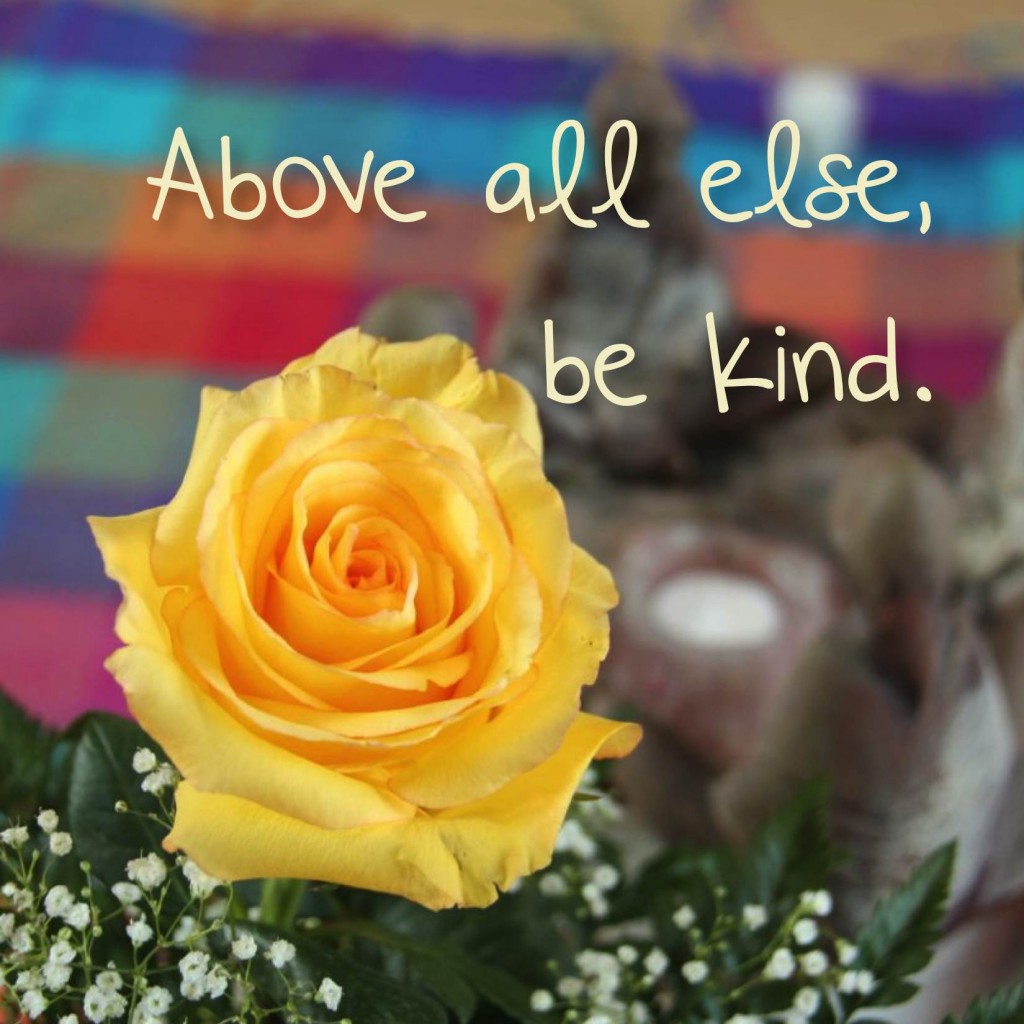by Heather Plett | Sep 27, 2012 | Uncategorized

Some days
when all it takes to make you cry
is a heap of dirty laundry and an empty bottle of laundry soap,
and you can’t stop viewing the future
through the lens of your self pity,
then the best that you can do
is find a place to sit where nature holds your wild heart
in her tender hands
and kisses it where it’s broken.
by Heather Plett | Sep 24, 2012 | journey, practice

Yesterday, Ronna Detrick and I (and the women who’d gathered in circle with us) had a heart-opening conversation about pilgrimage, community, story-telling, and feminine spirituality. (You can listen to the recording here.) I love having conversations like this because, even if I’m the one doing the teaching, I always end up walking away with more clarity than I had before.
At the end of the call, after I’d shared several stories of the “hardships, darkness, and peril” along my own pilgrimage, Ronna asked me to talk about how I hang onto hope in the middle of the dark times.
It’s a timely question for me, and it’s been on my mind since our conversation. As much for myself as for you, the following are some reminders of how to reach for hope when life knocks us off our feet.
1.) Find community. I can’t stress this strongly enough. You NEED community. You need a circle of people who will support you and who won’t judge you when you’re falling apart. You need to let yourself be held when you’re not feeling strong enough to walk on your own. There is no weakness in admitting that you need other people.
2.) Find wild spaces to wander in. When I’m falling apart and hardly know how to articulate the depths of the pain, I head to the woods or the riverbank. I find the Goddess there, in the most unexpected ways – in the wind, in the waves on the river, in the twinkling light reflected off the water, in the eyes of the deer who stands and stares at me. I think the Goddess is especially comfortable showing up in wild spaces because she has a wild heart herself. I feel comforted and more alive when I step out of the woods and return to my hope.
3.) Rest. It’s always important to rest, but when you’re going through especially difficult times, you need to find even more rest than usual. Deep, soulful rest that replenishes your strength. Take naps and hot baths, curl up with a good book, let people do some of your chores for you – just rest.
4.) Give yourself permission to cry. A social worker once told me that tears are the window-washers of the soul. It might sound a little corny, but it’s true. The tears help clean us and they help improve our vision. Let those deep sobs erupt from your belly and don’t try to keep them inside. Tears held in for too long will drown you.
5.) Find spiritual practices that sustain you. I’ve said this many times and I’ll say it again – spiritual practices are especially necessary when your pilgrimage gets difficult. Your spiritual practice can be as unique as you are – dancing, singing, walking, painting, praying, meditating, yoga, or photography. These practices shift us out of our left-brain thought processes that want to fix our problems or find logic in them or rush through them to the next easy place on the journey. Inside the practice, we rest in the unknowing space, where the problems serve as our teachers rather than our adversaries.
by Heather Plett | Sep 22, 2012 | journey, Labyrinth

This story has no clear beginning and no clear ending. It’s a pilgrimage story, and without going all the way back to the beginning of my life (and even the lives that were lived before mine that thread through mine), or waiting until I’m ready to die, I can only tell you about a small portion of that pilgrimage.
This week I’ve been revisiting my memoir, hoping to bring it to completion and eventually get it published. I set it aside months ago, thinking it was almost finished, but feeling like I might still be missing a piece of the puzzle.
I think I’ve found that puzzle piece. It started with adding the above words to the beginning. The story is now a pilgrimage story, with no clear beginning and no clear ending.
It used to be simpler. The very first time I tried to write it, it was about the three week period in the hospital waiting for Matthew to be born, and how that impacted me in a deeply spiritual way. The second time I wrote it, it was about a ten year transformation in my life, starting with the arrival of Matthew in my life. I was comparing myself to a caterpillar, going into a cocoon for ten years and eventually emerging as a butterfly. Or Theseus, heading into the labyrinth holding the thread, slaying the minotaur, and emerging victorious. And they all lived happily ever after. The end.
But now, after months of contemplation, I know that it’s not that straight-forward. Transformation is not a clean and simple thing that we can put into time frames or boxes. I’m still transforming. I’m still being stretched. I’m still not a butterfly. I’m heading back into that labyrinth again and again.
And so I am more satisfied calling my journey a pilgrimage. My son’s death was one of a long series of initiations, each one taking me deeper and deeper into my own heart. Each one teaching me how little I actually know. Each one revealing something new about God.
Now I am at a new place in the journey. In past initiations on this pilgrimage, I have lost my innocence, lost a son, lost a father, nearly lost a husband more than once, lost a father-in-law, and lost all of my grandparents. (Incidentally, nearly all of those things happened around this time of year.) I have fought the minotaur many times and returned from the labyrinth scarred and yet stronger. I expect my next initiation will be to learn what it’s like to lose a mother.
My responsibility as a pilgrim is simply to put one foot in front of the other and keep following the path. When the labyrinths appear along the path, I need to trust that a sword and a thread will be provided to help me survive.
If you’re interested in being part of a conversation about life as pilgrimage, join me tomorrow morning as I talk to my friend Ronna Detrick on her virtual Sunday Service at 10 am PST.
Most of us arrive at a sense of self and vocation only after a long journey through alien lands. But this journey bears no resemblance to the trouble-free ‘travel packages’ sold by the tourism industry. It is more akin to the ancient tradition of pilgrimage – ‘a transformative journey to a sacred center’ full of hardships, darkness, and peril. – Parker Palmer, Let your Life Speak
by Heather Plett | Sep 18, 2012 | gratitude, practice

I won’t pretend that things are easy right now. It’s not the way I walk in the world. I won’t dump every sadness on you every time we meet, but when it comes to my writing, I choose not to plaster a shiny happy mask over a broken life. I believe that’s what you come here for – a tiny light that struggles to shine even when the dark clouds roll in.
No, life is not easy. There are some really good days now and then, but mostly life continues to be hard and I continue to cry a lot of tears over a lot of wounds and disappointments.
BUT… that doesn’t mean that life is not beautiful. Beauty is not dependent on ease or perfection. Beauty emerges through (and because of) the pain and the brokenness, the storm clouds and the rain.
We wouldn’t value light if we didn’t see shadow. We wouldn’t know joy if we didn’t understand sorrow. We wouldn’t have flowers if we never had rain.
There is a crack in everything. That’s how the light gets in. – Leonard Cohen
And so, in the middle of my darkness, I look for the crack that lets in the light.
To add another metaphor to Leonard Cohen’s wisdom, my rock balancing has also taught me that there is a rough edge on everything – it’s what helps it keep its balance.
Exactly 12 years ago this month, I was in the hospital hoping my son would survive a compromised pregnancy. In the first few days, when the surgery failed and I had to resign myself to weeks in bed away from my busy career-driven life and my two beautiful little girls, I gave in to despair, fear, and anger. WHY couldn’t the doctors have taken me seriously the week before when I told them something was wrong with my pregnancy? WHY did they have to botch the surgery? WHY was I stuck in a bed when other people were walking around blissfully enjoying their pregnancies? WHY was I being yanked out of my life at the pinnacle of my career when my staff needed me most? WHY, WHY, WHY?
Then one day I realized I had a choice to make – I could continue to stay mired in the despair and bitterness, or I could accept what was happening and begin to see the tiny specks of light shining through the crack.
I chose the light.
It all started to shift the day I started a gratitude journal. At first the journal was simply a place to keep track of the things I’d need to send thank you cards for – the flowers sent from a friend in Ontario, the pyjamas sent from my sister-in-law in California, the food delivered by family, the care provided for my children, etc., etc. Soon, though, it began to take on a life of its own. It was my life-line, holding me close to shore when the storm threatened to toss me out to sea. The simple act of recording all that I was grateful for shifted my attitude from despair to hope and reminded me what I still had to live for.
Because of that gratitude practice, I was more prepared to handle my son’s death a few weeks later.
I think it’s time to start recording my bits of gratitude again. I need to reach for the specks of light seeping through the jagged ugly crack that is consuming my life. I need a life-line to hold me close to shore.
Here is my beginning…
I am grateful for:
– a river that runs within a block of my house
– the discovery that balancing rocks on the riverbank brings me peace and comfort in this time of imbalance
– a husband who sees my tears, sends me to bed, closes the door, and promises that he won’t let the supper burn that I’ve left on the stove
– the 46 years worth of love I’ve received from my Mom
– the little bit of wilderness I can find in the park down the street from my house
– the circles of women (both physically near and far away) who give me safe places to fall apart
– the early signs that a diet change and the supplements from my naturopath are beginning to address my fatigue
– green tea with ginseng and honey
– a make-it-yourself kaleidoscope from a friend
– butternut squash soup
– a long, meandering conversation with a friend at the river’s edge
– endless games of dominoes and rummicube with my mom and her husband
– siblings and siblings-in-law who love Mom as much as I do and who are so easy to get along with in this time of grief
– daughters who are grounded and wise
– a laundry room that’s clean enough that I don’t feel waves of failure and guilt every time I walk into the room
– you, my readers, clients and friends
by Heather Plett | Sep 13, 2012 | Compassion

I have been the recipient of a great deal of compassion lately – openhearted, open-armed, soul-enriching compassion. I am deeply blessed.
It brings to mind the simple words my Dad used to say almost every time we left the house. “Be kind,” he said, and we knew that if we did nothing else but offer someone kindness that day, then we had been successful in Dad’s eyes.
There have been a LOT of successful people in my life lately.
Not only have I been comforted and encouraged by kindness, I have been educated by it. Here are my thoughts, based on what I’ve witnessed, about how to offer compassion to people you care about who are going through tough times.
1. Create safety. The most important thing you can do is offer the person a safe place to fall apart. Be trustworthy, be present, be available, and be soft. Give them the warmth of your touch, the comfort of your words, and the gift of your listening.
2. Refrain from offering advice until you know they’re strong enough to receive it (and/or they’ve asked for it). When a person is feeling vulnerable and broken, unsolicited advice can make them feel like they’ve failed or they’re not as good as you are at handling difficult times. Your advice may be valuable, but don’t offer it if it will make them feel small.
3. Withhold judgement. Nobody who’s going through a difficult journey wants to be judged for their weakness, their tears, their messy home, or their indecisiveness. Bite your tongue even if you think they’re being foolish or immature. Let them be weak if they need to be weak. There will be time for strength later.
4. Be an active listener. Let the person suffering do most of the talking and be fully present for what they are saying. In the middle of the struggle, there is nothing quite as powerful as knowing that you are heard and seen. Don’t try to fill the silences with platitudes or solutions. Leave as much space as they need to share their stories and work through what they need someone to hear.
5. Offer empathy, not sympathy. Empathy lets a person know they’re not alone, sympathy leaves them feeling inferior. Empathy builds bridges, sympathy builds walls. People who offer sympathy (eg. “poor you”) instead of empathy are usually doing it because they feel some need to elevate themselves above the other person.
6. Share your stories to make them feel less alone, but don’t overshadow their stories. Stories are really important in times of grief or stress, but the most important stories that need to be shared at that time are the ones that belong to the person going through the trouble. Offer your own stories in a respectable manner, but only after they’ve had a chance to share theirs.
7. Do not pretend to know EXACTLY what they’re going through. You can’t possibly know just what they’re experiencing because you are a different person carrying different baggage. You may have been on a similar path and felt similar pain (and that’s worth sharing), but each person’s path is his/her own. Let them describe what they’re going through rather than assuming you know.
8. Let them cry. Cry with them if that is what emerges. Don’t try to end their grief or fix their pain. Sit with them in the middle of that field of grief and just let what is be what it needs to be. Nobody can take a shortcut through pain, so don’t pretend you’ve found one. Watching a loved one cry feels excruciating, and you really, really want to fix it for them, but to show them the kind of love they need, you need to let the tears flow and simply bear witness.
9. Let them know that they are courageous, even if their courage only shows up in very small ways. When the road is hard, just putting one foot in front of another takes courage. Sometimes getting out of bed in the morning takes courage. Help them discover their own basketful of courage stories – memories of the times when they have shown courage that will help them rise to the challenges ahead.
10. Just love them. Plain and simple. Bring them supper, buy them chai latte, babysit their kids, take them out to a movie, show up to help them serve the food at the funeral they’ve been dreading, sit with them at the hospital, buy them toilet paper when you’re sure they haven’t had a moment to go shopping, drop love notes in their mailbox… do whatever it takes to let them know they are surrounded by love.





